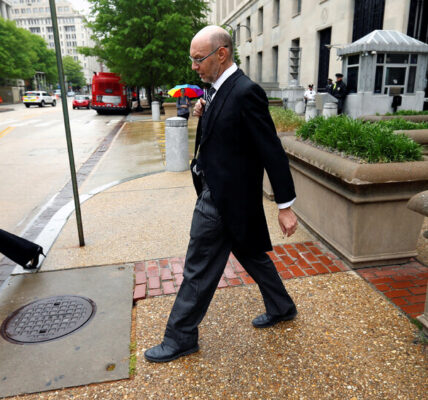A person involved in the effort to distribute aid said that armed criminal gangs were operating with near-total freedom in the Israel-Gaza border area where trucks must pass, and attacking them daily. The person described the attacks as coordinated and organized, not the spontaneous looting by desperate Gazan civilians that vexed aid convoys in earlier months of the war.
Armed attackers shoot at the trucks, force them to stop and sometimes beat the drivers before stripping the trucks of their contents, the person said.
And there is no one to call for help: The Hamas-run police force that helped secure the passage of aid earlier in the war melted away months ago after the Israeli military killed several officers. (The person spoke on the condition of anonymity because he was bound by confidentiality agreements.)
The “lack of any police or rule of law in the area” has rendered the roads surrounding the crossing highly dangerous, Mr. Haq said.
The number of international aid trucks reaching Palestinians in southern Gaza has plummeted since Israel’s Rafah offensive began on May 7. Only a small amount of aid has trickled through Kerem Shalom, aid officials say, including what a Western aid official said were 30 trucks sent via Jordan on Monday. Even the 1,100 truckloads stranded at the crossing — equivalent to what would have entered Gaza in just over two days before the war — represents a tiny fraction of what aid groups say is needed to stave off famine in Gaza.
Another border crossing, at Rafah on the Egypt-Gaza border, has remained closed since the Israeli operation began.
In an attempt to make up for the shortfall, the Israeli authorities began allowing more commercial goods to enter Gaza from Israel and the occupied West Bank. Unlike U.N. convoys, these trucks tend to travel with armed protection, allowing them to traverse the dangerous terrain.
Israel had paused commercial deliveries for about two weeks in an attempt to allow aid trucks to move through, according to a U.S. official working on the aid effort. But on Sunday, with no aid traveling along that road because of insecurity, Israel resumed sending the commercial trucks, 20 of which went into Gaza, the official said.
The U.S. and Western aid officials spoke on the condition of anonymity because they were not authorized to speak publicly.
Saed Abu al-Ouf, a Gazan businessman who has sent about three truckloads of rice into the enclave since mid-May, said he had paused the shipments because of the armed gangs. In the past, he said, he had paid thousands of dollars in protection money to a group of Gazans to secure his trucks.




